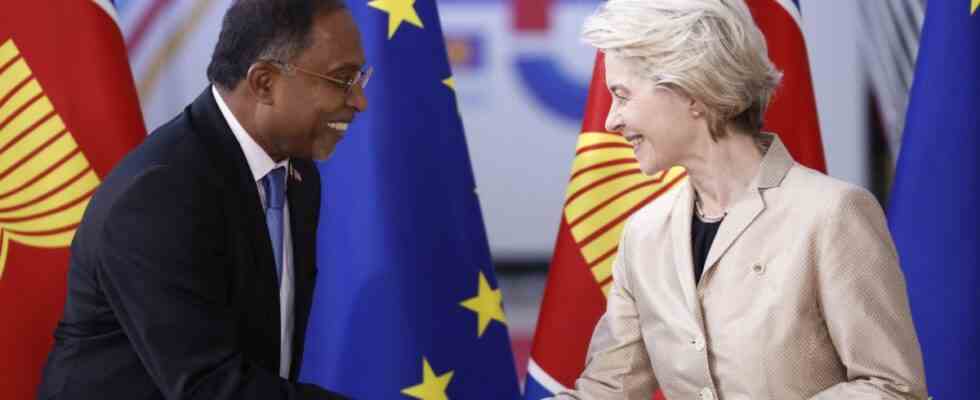It’s not as if there aren’t enough problem countries in our own neighborhood for the EU to deal with. There is Russia invading Ukraine. There is Hungary, an EU member that constantly blackmails and blocks the union. And there are a number of other states that are not behaving as Brussels would like them to, from Serbia to Turkey.
However, one country forms its own category in terms of potential problems: China. It took some time – and probably also pressure from the USA – but now the question of how Europe should deal with Beijing is practically always a topic in Brussels. China is, as Americans say, “the elephant in the room,” a big, nasty thing that you may not always want to talk about openly, but it’s still not going away.
That was the case on Wednesday, for example. The first EU-ASEAN summit took place in Brussels. The leaders of the 27 union countries met with their counterparts from the states belonging to the Association of Southeast Asian Nations (ASEAN): Brunei, Cambodia, Indonesia, Laos, Malaysia, Myanmar, the Philippines, Singapore, Thailand and Vietnam. Only two representatives were absent: French President Emmanuel Macron was watching football in Qatar, and no one had been invited by the junta in Myanmar.
Since the attack on Ukraine, Europe’s interest in Asean has grown
And although China neither attended nor was mentioned on the agenda, it was highly present at the summit. The talks about more trade between Europe and the ASEAN countries, the announcement by EU Commission President Ursula von der Leyen that she would invest ten billion euros in the region, the commitment to stability, security and a “rules-based international order” – all of that also aimed at China.
The EU’s interest in the Asean region has grown significantly since the Russian invasion of Ukraine – but so has skepticism about Beijing. Moscow’s war has not only shown Europeans how great and politically dangerous their dependence on Russian oil and gas is. He also reminded them that the dependence of some European economies – most notably Germany’s – on Chinese raw materials, products and markets is far greater and more problematic.
The EU therefore now wants to “diversify” in Asia: Brussels is aiming for further trade agreements with the Asean countries, and cooperation on renewable energy is to increase. The 10 billion euros for investments come from an EU pot called Global Gateway, which is there to counter the huge sums that Beijing is distributing around the world. The hope in Brussels is that Asean countries will see the EU as a reliable new partner and not just tie themselves to China.
China now also plays a central role in relation to one of Europe’s oldest partners – the USA. On the one hand, this has to do with the fact that US President Joe Biden is urging Europeans to compete with the dictatorial regime in Beijing. But it also has to do with the fact that Washington is making decisions with a view to China’s economic and technological rise that have negative consequences for Europe.
US policy with side effects
That is the case with the so-called Inflation Reduction Act (IRA), which the US Congress passed in August. The law releases a mid-three-digit billion amount for tax incentives and subsidies, among other things, to expand renewable energies in the United States and to promote sales of electric cars. On the one hand, the IRA is a serious climate protection law. On the other hand, the law stipulates that only companies or products that are wholly or partly manufactured or assembled in the USA benefit from the grants and tax rebates.
In this way, Biden wants to strengthen domestic industry – but also break China’s supremacy in many green technologies. According to Brussels, the law is expressly intended to be “anti-Chinese”. However, there is a side effect: the clauses in the IRA, which disadvantage Chinese manufacturers, also discriminate against European companies. The EU therefore fears that European companies will move factories to the USA in order to receive state aid there.
The European answer to this is two-pronged. First, Brussels is currently negotiating with Washington to add exemptions to the law’s implementing provisions so that European corporations are not discriminated against. According to the EU, there is a willingness in America to do this, provided the law remains essentially anti-Chinese.
On the other hand, however, the EU Commission is working on its own pot of money under the name “European Sovereignty Fund”, from which Europe could financially support its domestic green technologies. “We need to increase Europe’s public investment to accelerate the energy transition,” von der Leyen wrote on Wednesday in a letter to Union leaders scheduled to discuss the issue at an EU summit in Brussels on Thursday . According to von der Leyen, such a fund could compensate for the competitive disadvantages that would arise in Europe as a result of the IRA law.
This leads to a remarkable and diplomatically not very easy situation: an American law that – at least according to the interpretation in Brussels – is primarily aimed at China, also harms Europe. The European response, in turn, consists of measures that are more anti-US. At least there are assurances in Brussels that they don’t want a “trade war” with America. One war, the one in Ukraine, is enough.

